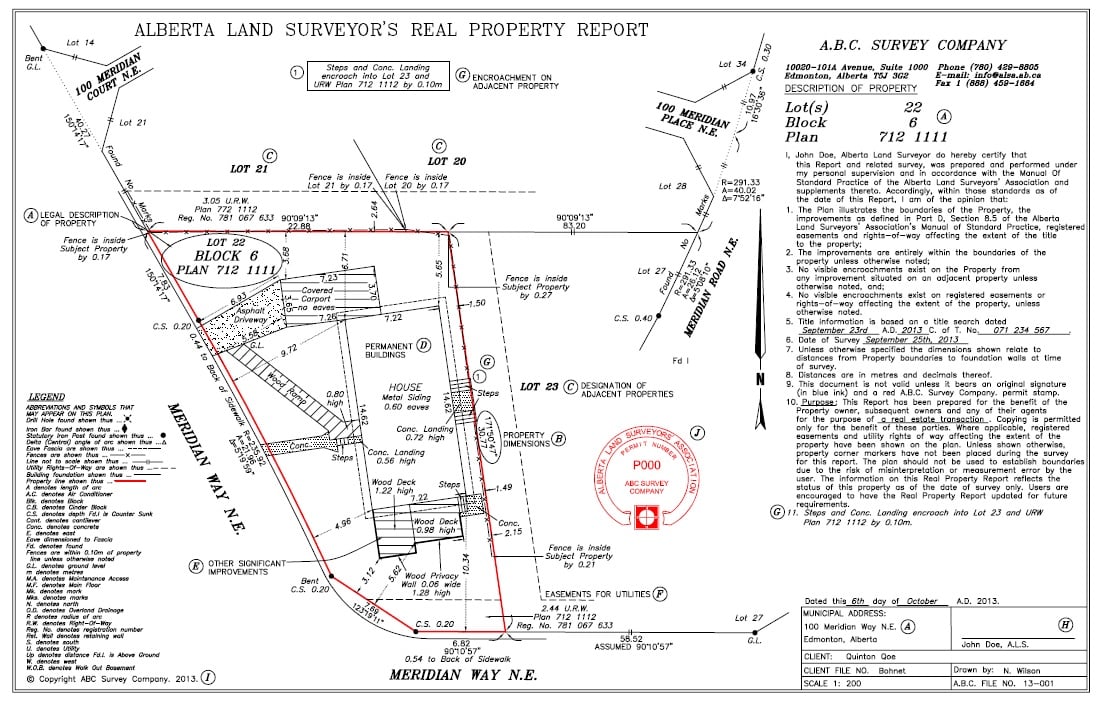Selling your home? One of the most overlooked yet crucial steps in preparing for a smooth sale is obtaining a Real Property Report (RPR) with Compliance. This document, required in most Alberta real estate transactions, is more than just a piece of paper—it’s an essential part of the disclosure process and can impact your home sale timeline.
On average, obtaining and finalizing an RPR with compliance takes between 4 to 6 weeks. This includes:
- Surveying and RPR Preparation (2-4 weeks) – A land surveyor will assess your property and draft the RPR.
- City Compliance Review (2+ weeks) – The municipality will review the RPR and issue a compliance stamp.
- Potential Additional Delays – If compliance issues are found, resolving them (e.g., variances, permits, or structure modifications) can extend the timeline by several weeks or even months.
Why act now? If you wait until you have a buyer to start this process, you could face closing delays—or worse, risk losing the sale entirely if the buyer walks away due to unresolved compliance issues. By starting early, you ensure a smoother transaction and avoid last-minute roadblocks.
What is a Real Property Report?
A Real Property Report (RPR) is a legal document prepared by an Alberta Land Surveyor that outlines property boundaries, structures, and improvements, such as decks, fences, and garages. It confirms whether everything is compliant with municipal regulations and bylaws.

Why Does It Matter for Sellers?
- Time is of the Essence – Getting an RPR takes time. Ordering one from a surveyor can take 2-4 weeks, and if compliance issues arise, addressing them could take even longer. Planning ahead ensures you’re not scrambling at closing.
- City Compliance is Key – The City must review the RPR and issue a Compliance Stamp confirming that structures meet zoning and setback requirements. Without this, a buyer may delay or back out of the deal.
- Buyers Expect Transparency – An updated RPR provides clear property details, reducing the risk of disputes over property lines or unauthorized structures.
- RPRs Must Be Updated When Changes Occur – If you’ve made modifications to your property, such as adding a deck, shed, or garage, your existing RPR may no longer be valid. Ensuring it reflects the current state of your property is essential for compliance and disclosure.
- Title Insurance Isn’t a Substitute – While title insurance can offer some protection, it doesn’t confirm compliance with municipal bylaws. Buyers and lenders often prefer an RPR to ensure no hidden issues exist.
- Avoid Last-Minute Surprises – If the City finds a compliance issue, you may need permits, variances, or even modifications to structures—delays that could put your sale at risk.
Common Issues Found on a Real Property Report
When reviewing an RPR, common issues that may arise include:
- Encroachments – A fence, garage, or other structure crossing onto a neighbor’s property or city land.
- Non-compliant Setbacks – Structures built too close to property lines, violating zoning bylaws.
- Unpermitted Additions – Decks, sheds, or extensions built without proper permits.
- Changes Not Reflected – Outdated RPRs that don’t show recent additions or modifications.
- Easements and Right-of-Ways – Utility or municipal access areas that may restrict development or use.
- Municipal Compliance Issues – The City may require modifications or permits before issuing compliance approval.
The Process of Obtaining an RPR
- Check if Your RPR is Up to Date – If you’ve made additions or changes to your property, a new survey will be required.
- Hire an Alberta Land Surveyor – Schedule a survey as early as possible. (Hagen Surveys | Arc Surveys | Geodetic Surveys)
- Submit to the City for Compliance – Once the surveyor completes the RPR, submit it to your municipality for a compliance review.
- Address Any Issues – If your home has non-compliant structures, you may need to apply for variances or remove unauthorized additions.
- Provide the RPR to Buyers – Once stamped, include it in your listing documents for transparency and smooth negotiations.
How Much Does an RPR Cost?
The cost of obtaining or updating an RPR varies based on the property and the surveyor you hire. On average, homeowners can expect to pay between $700 and $1,500 for a new RPR, with additional fees for compliance review and any necessary variances. While this may seem like an added expense, having an up-to-date RPR can prevent costly delays and negotiation hurdles.
Be Proactive, Sell with Confidence
Don’t let an outdated or missing RPR derail your home sale. If you’ve made any changes to your property, updating your Real Property Report is crucial to avoid delays. Getting ahead of the process ensures a seamless transaction and builds trust with buyers. Need help navigating this step? The team at ARIVL is here to guide you through every detail—because selling should be an adventure, not a headache!
